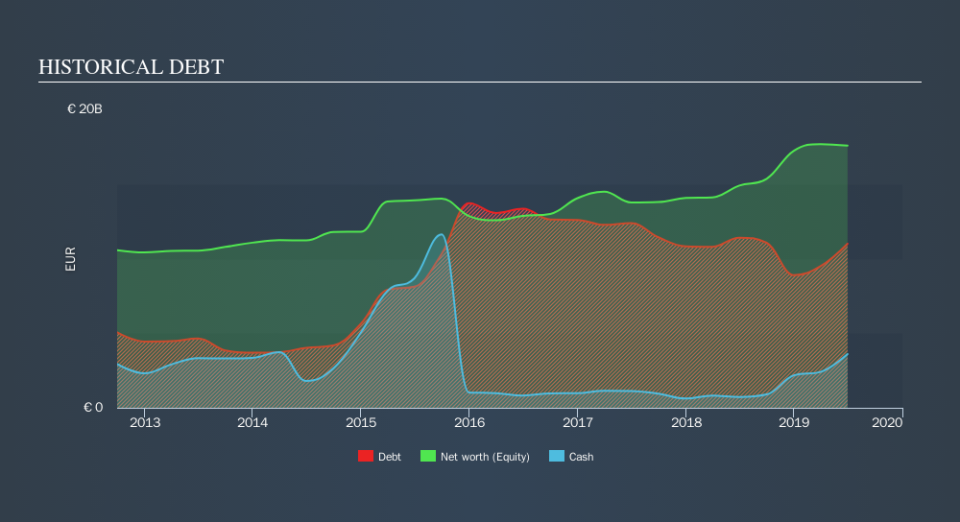These 4 Measures Indicate That MERCK Kommanditgesellschaft auf Aktien (ETR:MRK) Is Using Debt Reasonably Well

David Iben put it well when he said, 'Volatility is not a risk we care about. What we care about is avoiding the permanent loss of capital.' So it might be obvious that you need to consider debt, when you think about how risky any given stock is, because too much debt can sink a company. Importantly, MERCK Kommanditgesellschaft auf Aktien (ETR:MRK) does carry debt. But is this debt a concern to shareholders?
When Is Debt Dangerous?
Debt is a tool to help businesses grow, but if a business is incapable of paying off its lenders, then it exists at their mercy. If things get really bad, the lenders can take control of the business. However, a more common (but still painful) scenario is that it has to raise new equity capital at a low price, thus permanently diluting shareholders. By replacing dilution, though, debt can be an extremely good tool for businesses that need capital to invest in growth at high rates of return. The first thing to do when considering how much debt a business uses is to look at its cash and debt together.
View our latest analysis for MERCK Kommanditgesellschaft auf Aktien
How Much Debt Does MERCK Kommanditgesellschaft auf Aktien Carry?
As you can see below, MERCK Kommanditgesellschaft auf Aktien had €11.0b of debt, at June 2019, which is about the same the year before. You can click the chart for greater detail. However, it also had €3.61b in cash, and so its net debt is €7.40b.
How Healthy Is MERCK Kommanditgesellschaft auf Aktien's Balance Sheet?
We can see from the most recent balance sheet that MERCK Kommanditgesellschaft auf Aktien had liabilities of €10.5b falling due within a year, and liabilities of €11.5b due beyond that. Offsetting these obligations, it had cash of €3.61b as well as receivables valued at €3.77b due within 12 months. So its liabilities total €14.6b more than the combination of its cash and short-term receivables.
MERCK Kommanditgesellschaft auf Aktien has a very large market capitalization of €42.9b, so it could very likely raise cash to ameliorate its balance sheet, if the need arose. But it's clear that we should definitely closely examine whether it can manage its debt without dilution.
We measure a company's debt load relative to its earnings power by looking at its net debt divided by its earnings before interest, tax, depreciation, and amortization (EBITDA) and by calculating how easily its earnings before interest and tax (EBIT) cover its interest expense (interest cover). Thus we consider debt relative to earnings both with and without depreciation and amortization expenses.
MERCK Kommanditgesellschaft auf Aktien's net debt of 2.0 times EBITDA suggests graceful use of debt. And the fact that its trailing twelve months of EBIT was 8.6 times its interest expenses harmonizes with that theme. Sadly, MERCK Kommanditgesellschaft auf Aktien's EBIT actually dropped 4.3% in the last year. If earnings continue on that decline then managing that debt will be difficult like delivering hot soup on a unicycle. There's no doubt that we learn most about debt from the balance sheet. But it is future earnings, more than anything, that will determine MERCK Kommanditgesellschaft auf Aktien's ability to maintain a healthy balance sheet going forward. So if you're focused on the future you can check out this free report showing analyst profit forecasts.
But our final consideration is also important, because a company cannot pay debt with paper profits; it needs cold hard cash. So we always check how much of that EBIT is translated into free cash flow. Over the most recent three years, MERCK Kommanditgesellschaft auf Aktien recorded free cash flow worth 80% of its EBIT, which is around normal, given free cash flow excludes interest and tax. This free cash flow puts the company in a good position to pay down debt, when appropriate.
Our View
When it comes to the balance sheet, the standout positive for MERCK Kommanditgesellschaft auf Aktien was the fact that it seems able to convert EBIT to free cash flow confidently. But the other factors we noted above weren't so encouraging. For example, its EBIT growth rate makes us a little nervous about its debt. When we consider all the elements mentioned above, it seems to us that MERCK Kommanditgesellschaft auf Aktien is managing its debt quite well. But a word of caution: we think debt levels are high enough to justify ongoing monitoring. Above most other metrics, we think its important to track how fast earnings per share is growing, if at all. If you've also come to that realization, you're in luck, because today you can view this interactive graph of MERCK Kommanditgesellschaft auf Aktien's earnings per share history for free.
At the end of the day, it's often better to focus on companies that are free from net debt. You can access our special list of such companies (all with a track record of profit growth). It's free.
We aim to bring you long-term focused research analysis driven by fundamental data. Note that our analysis may not factor in the latest price-sensitive company announcements or qualitative material.
If you spot an error that warrants correction, please contact the editor at editorial-team@simplywallst.com. This article by Simply Wall St is general in nature. It does not constitute a recommendation to buy or sell any stock, and does not take account of your objectives, or your financial situation. Simply Wall St has no position in the stocks mentioned. Thank you for reading.

 Yahoo Finance
Yahoo Finance 
